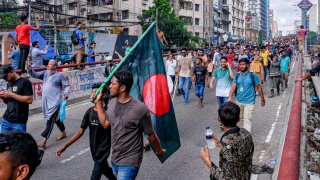Challenges for the U.S. in a New Bangladesh
Having lost influence and credibility in Afghanistan, Sri Lanka, Maldives, and now Bangladesh, Washington will need to recalibrate its Indo-Pacific Strategy.
The Indo-Pacific region is essential to U.S. interests. Nearly $1.9 trillion worth of U.S. goods transited through the region in 2019. In 2024, 42 percent of global exports and 38 percent of global imports are expected to pass through this region. The IPS is working toward containing and limiting China’s challenge to the regional status quo and establishing a naval and maritime regional command. In particular, both the United States and Japan are concerned about China’s assistance to Southeast Asian countries in areas of infrastructure, loans, technology transfer, private sector investment, and increased commercial trade.
Integral to this alliance is India’s ability to exert and maintain influence in South Asia. Having lost influence and credibility in Afghanistan, Sri Lanka, Maldives, and now Bangladesh, Washington will need to recalibrate the IPS and India’s role in it. Essential to the IPS is for INDOPACOM to share information and train Bangladeshi naval and air forces for joint exercises to be prepared for any potential regional conflicts. The revolution may halt further cooperation as the new Bangladesh re-evaluates its historical bilateral and multilateral relationships.
The vitriolic hatred for India in the current Bangladesh streets, and consequently, anti-Americanism, means that the new Bangladesh may not cooperate as easily with the U.S. IPS strategy, thus losing an integral partner. The United States could seek to continue the U.S.-Bangladesh Dialogue in Security, increase allocations from the U.S. Counterterrorism Fund, and commit to foreign direct investments to convey a long-term investment in the bilateral relationship. However, in this climate where the new Bangladesh is interested in forming tribunals against military officials and Awami League party members who committed atrocities against civilians, the United States needs to delicately support this transitional phase by emphasizing the importance of democratic institutions, the paramount importance of the rule of law, and allowing Bangladeshis to carve out a future that doesn’t emphasize economy and tyranny over democracy.
Qamar-ul Huda is the Michael E. Paul Chair in International Affairs and a Distinguished Visiting Professor at the United States Naval Academy (USNA). He previously served as a senior policy advisor to the U.S. Department of State and the United Institute of Peace. He is the author of Reenvisioning Peacebuilding and Conflict Resolution in Islam (Rowman & Littlefield, 2024). He tweets @qbhuda.
Image: Tanjil Rahman / Shutterstock.com.

